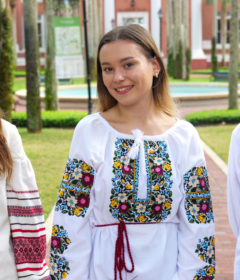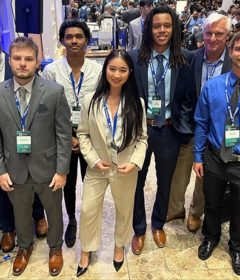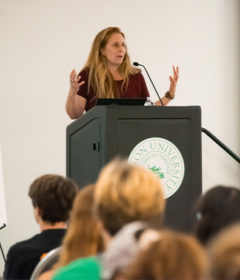EMBA group tackles theme park logistics
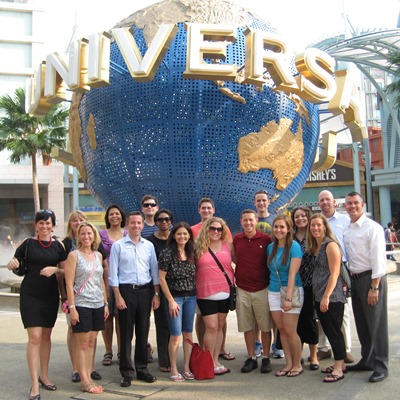 Singapore seemed like a slam dunk.
Singapore seemed like a slam dunk.
Everything pointed to the hypothetical success of another world-class, American theme park at the bottom of the Malay Peninsula in the South China Sea.
But the slam dunk turned into a long shot when two Stetson Executive MBA (EMBA) students researching the project went to Singapore to see the island city-state first hand.
What they learned changed their minds and conclusion, said Lauren Hall and John (Cody) Hampton, both of Orlando with theme park careers, both pictured below.
The case study not only earned them a high grade from Jon Carrick, Ph.D., professor of international business, but also is gaining a professional reputation for itself. Hall and Hampton presented their findings at the annual conference of the Academy of International Business, Southeast USA Chapter.
“The research paper stirred a lot of interest,” said Carrick who noted that mere acceptance to the Atlanta conference from a field packed with Ph.D.s reveals the high quality of the work.
“We had many people asking if they could use the paper for classes and one person inquired about using it in a textbook,” said Carrick, who mentored the research and accompanied students on the trip to Singapore and Vietnam.
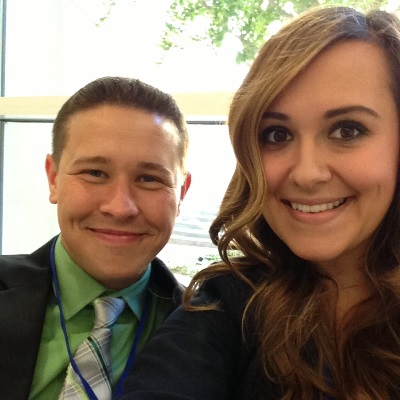 Every EMBA cohort at Stetson makes a business study visit to at least one international market. On this Asian field study, cohort 10 met and questioned business leaders, industry experts, residents and tourists.
Every EMBA cohort at Stetson makes a business study visit to at least one international market. On this Asian field study, cohort 10 met and questioned business leaders, industry experts, residents and tourists.
The strongest lesson of the learning experience, according to students of the 19-month program, was coping with unexpected evidence that radically changed their conclusion.
“I don’t believe we would have arrived at the same conclusion had we not gone to Singapore,” said Hall. “The first-hand conversations with executives and tourists in Singapore were instrumental in shaping our opinions.”
“We had to be flexible in our thoughts and drop any biases we initially had,” said Hampton who gained a “more holistic view of business.”
The case study, titled “Singapore Disney Theme Park: Assessing Project Viability,” lays out critical pros and cons that would face a new theme park on the 276-square-mile island. A Universal Studios theme park is already there, as are world-class resorts, two casinos and the largest oceanarium in the world. Legoland Malaysia is just across the mile-wide Johor Strait from Singapore’s 5.4 million people.
“A lengthy tour of Universal Studios in Singapore and access to its executive team produced key information for Hall and Hampton and was a catalyst to dive deeper into their research,” said Wendy Lowe, assistant director of Stetson’s EMBA program.
Positive factors, including a stable currency, a booming economy, low corruption and high personal wealth – one in five residents are millionaires – were trumped by negative factors like rigid regulations, multi-billion dollar financing and finding land on the cramped island.
Many of the newer, larger tourist attractions in the city are built on man-made land and floating platforms, according to students in the cohort, and the investment to create new land is much more costly than a normal construction project.
The next step for the scholarly team is publication in a peer-reviewed academic journal, an uncommon thing for student papers, said a confident Carrick. He and Carolyn Mueller, Ph.D., an international business professor who also attended the AIB conference, will help Hall and Hampton prepare the paper for publication.
“It is a long and drawn-out process to get a paper published in a journal,” said Carrick. “It may take 12-18 months of reviews and rewrites.”
“This case study is a good example of faculty passion and student collaboration,” said Greg McCann, J.D., director of the EMBA program at Stetson.
“Carrick’s passion for teaching and gifted scholarship helped students produce meaningful research,” said McCann, “and the result shows how effectively EMBA students connect and collaborate to produce impactful research.”
Hall and Hampton, who graduate in May 2014, agree that the EMBA program has grown their confidence in research skills, writing, presentation and making recommendations. The paper is a good illustration, says Hall, of the way her EMBA work changed her perspective.
“It changed the way I see challenges and opportunities within business,” she said. “I now have the skills and knowledge I need to assess the viability of a potential project from a variety of angles that I would not have considered prior to beginning the EMBA program.”
For more information, visit the EMBA program website, call 321-939-7603 or email [email protected].
By Ronald Williamson

